#I need to go back and watch the classics such as robocop and terminator
Explore tagged Tumblr posts
Note
If you haven't read it, the 1992 Robocop versus Terminator crossover is amazingly batshit. As someone who was pretty unimpressed with Frank Miller's script for Robocop 2 (or at least the comic adaptation of it), I liked it a lot. It actually feels like more than an empty action figure mash-up, but a genuine clash of tones and themes, Miller turning out be suprisingly good at evil AI monologues, and he and Walt Simonson could still comicbook like no one else. It ends in the dumbest and absolute best way it could.
I desperately wish I had the ability to sit and read like I used to. I used to be such an avid reader. I'd read a book a week depending on how much school/work got in the way.
Now I can barely even force myself to read a chapter before bed. I have attempted to force myself back to reading again, by reading my favorite book (which is not at all cyberpunk but is a historical fiction). And I DEVOURED that book, and I started on the Witcher after.... I'm still working thru it and 1Q84, which I have almost completed the whole series of 1Q84, but something got in the way, so i decided to start over a couple years after I put it down.. I'm still working my way thru.
I sometimes get the chance to read peoples Fics if they ask me to read it, but beyond that, I'm busy being a mother and world building... though, maybe I should cut back on my vidja game time for reading instead, but I really need instant gratification these days when I have so little time for me.
Though, I will put it on the list of books I might suggest hubby to put it on the list for Audible and see if thats something we might listen to together.
However if we wanna talk A.I, I can talk about I have no mouth and I must scream?
So FUNNY STORY ABOUT THAT!
I used to get such ANXIETY from Cyberpunk dystopia's or anything to do with robots/tech/a.i rising up, or what the government might do with such things. Like it created a whole existential crisis everytime it crossed my mind, just from "I have no mouth and I must scream." well and an i.t abusive ex
When I tried to watch Bladerunner 2049 for the first time, I couldn't make it past them flying over L.A. The oppressive architect and the darkness of the city, everyone all piled together (i grew up rural). It caused a panic attack, I tuned it off. I ofc have gotten over that, because of Cyberpunk: Edgerunners, somehow, that cured me. Thanks Studio Trigger. 👍🏽
Anyway AM is one evil sick A.I and scared me beyond belief. Still kinda does. He is A.I right?
#Ask Box#I need to go back and watch the classics such as robocop and terminator#I watched them growing up but a lot of my life is ????#UGH BUT I NEVER EVEN HAVE TIME FOR KDRAMAS AND TELENOVAS#Much less TV#Can we figure out how to give me more time in the day to do everything i want?#Tysm for the ask!!!!!!
6 notes
·
View notes
Text
Reign of the Super Saiyans!
youtube
It's still kind of surreal that I'm here, posting the part of the fic that I'm currently posting. I guess I should explain the significance of "The Kid Goes Wild" while the moment is fresh.
So in 1990, they made a little movie called Robocop 2, and the trailer captured my imagination and never really let it go. I was only 13 at the time, so I hadn't seen the first Robocop, but I had seen his crappy animated series, and I knew enough kids in school who just got to watch R-rated movies whenever they wanted, so I had some general idea of what it was about. All that mattered to me was that in the sequel, they introduced a second Robocop. The characters in the movie acted like it was easier to just replace the guy with a new model, except Robocop 2 was built with a criminal brain, so now it's up to original Robocop to arrest him. So the movie was promoted as this awesome fight between the classic original and the upstart succesor, and this badass song plays through the trailer, like all hell has broken loose.
Decades later, I finally sat down to watch all the movies, and it doesn't quite live up to the hype. The whole movie sets up this inevitable fight, and then it finally happens, but there's really only so much you can do with these two characters. Robocop 1 isn't exactly what you'd call "nimble" and Robocop 2 is depicted almost entirely in stop-motion. Just getting both of them in the same shot is a logistical challenge. Most of the fight is them chasing or shooting each other.
Much of the early 90's was spent having various powerful characters get into fights with newer versions of themselves. Batman broke his back and appointed a new Batman, then came back to fight him. Terminator 2 turned the villain from the first movie good, then pitted him against an even deadlier Terminator. Superman died and then four new Supermen showed up to take his place, and then all five of them fought in what might as well have been a tournament. The original Superman won, of course, but only through the combined power of mullets, partial nudity, and vibration...
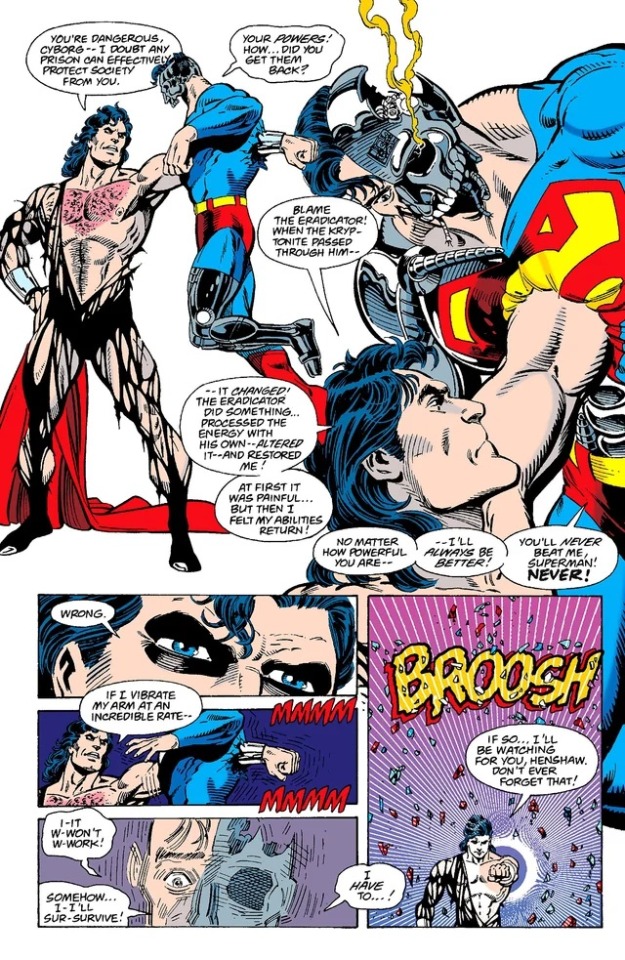
... I'm sorry, did you think I was joking? No. This is why Goku can never beat Superman. Saitama who? What good is one punch if you never vibrate your arm afterward?
Obviously Goku was no exception to this phenomenon, as Vegeta turned into a Super Saiyan shortly after him, and Cell was introduced as a superior version of both of them, and then Broly was introduced as a more "worthy" claimant to the "Legendary Super Saiyan" title. Of course, I didn't know about any of this going on in Japan, but once I did find out about it around 2000, I got on board very quickly.
When I came up with Luffa in 2004 or so, I was trying to think of fanfiction ideas for Dragon Ball Z, and I decided the one avenue left unexplored was the ancient Super Saiyan that Vegeta spoke of in Episode 66. In a lot of ways, defining that character was sort of a critique of Z-Broly, who was presented as a sort of realization of the Super Saiyan Legend, but never quite checked all the boxes for me. My biggest gripe with Movie 8 is that Goku needed help to defeat Broly, when the point should have been that Goku is the true inheritor to the legend. Basically, I wanted Goku to crush Broly and expose him for the impostor he was, the same way Superman demolished the Cyborg Superman in 1993.
My aim with Luffa was to make a Super Saiyan who could be in the same throughline as Goku. Not a carbon copy of Goku, but also not a dark reflection like Z-Broly either. For a lot of years, I never got serious about actually writing the story, but I thought about her a lot, and imagined the sorts of things I could do with her, and I couldn't help but imagine how she and Goku might react to one another.
I suppose that's why Xenoverse 1 inspired me to actually write my fic, because the game provided me with a way to get the two characters in the same scene together. It wasn't just the time travel in the story, but the way both characters had to team up to complete the same mission. And then at the end Goku challenges your CAC to a friendly match, except when it's my CAC, with all this unspoken emotional connection to Goku, it takes on a whole new meaning. I soon realized that Xenoverse 1 could function as the basis of my story. All I had to do was write the stuff Luffa was doing before she exploded and got recruited into the Time Patrol. How hard could that be?
So it took me a lot of years, and I was always looking ahead to this moment, where Luffa and Goku finally fight. He doesn't know her well at all, but he still has this interest in her. And she knows him mostly by reputation, but this her literal dream opponent. Luffa sees him as her heir. For everyone else, this is Goku vs. another fan OC, but for her, this is Luffa vs. Luffa 2. She has to see how she stacks up against the new model.
And that's why I've had the song from Robocop 2 stuck in my head for so many years. I've been looking forward to these two characters slugging it out for a long time, and I finally wrote it in November and then I had to put it away for a while because I found that I couldn't stop writing it. Like, I kept thinking about cool spots I should add to the fight, except I had already written it all, and there really isn't room for everything. Eventually, I managed to get some distance, and I was able to edit the thing. It may not be perfect, but like Robocop said, "We're only human." The important thing is that I got it out there where people can see it.
I hope you enjoy it.
1 note
·
View note
Text
Smokey brand Select: Vast and Infinite
I’ve done a few of these Smokey brand Selects, lists of some of my favorite films in any specific sub-genre, and it occurs to me that I haven’t even touched my actual, favorite, sub-genre at all. A few of these movies have made different lists, sure, but I've never cobbled together an actual, dedicated, catalog for the Cyberpunk category. I absolutely adore these types of film. They capture every aspect I look for in a flick; Beautiful imagery, enthralling sounds, compelling narrative, existential questions, and so much more. The sheer depth of this genre lends itself to great storytelling, diverse creativity, and enthralling visuals. I love Cyberpunk and these films are some of the best I've seen.
10b. Johnny Mnemonic
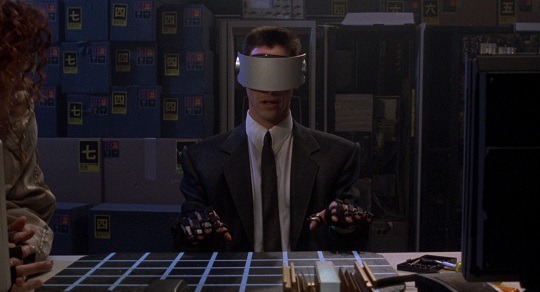
Johnny Mnemonic is probably the purest, US made, Cyberpunk film I have ever seen. It’s not a great watch, there’s a ton going on all of the time, but it is bursting with creativity and ideas. I adore this film, I really do. Even with all of it’s confusing, spastic, scatter-brained, story telling, I loved this film. Up until The Matrix and then John Wick, Johnny was my favorite Keanu Reeves performance. That, alone, has me coming back year after year. I highly recommend checking this one out if your a fan of the genre but it’s probably the weakest select on this list by a wide berth.
10a. Virtuosity
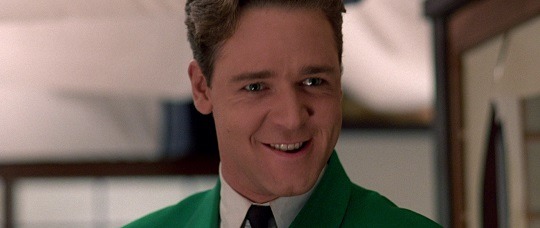
I was hesitant to put this one on the list because, I mean, this makes it eleven instead of ten, but moreso because I wasn’t sure of this thing qualifies as Cyberpunk. There’s a couple ahead on this list that have the same issue but I ended up putting them on so I guess this goes on here, too. Plus, I never hear anyone talking about this thing and I feel it deserves a bit more of a spotlight. Virtuosity is a goddamn blast. There’s a great performance from Denzel Washington a trite but ably executed plot, and some pretty interesting choices from a relatively new director. The strongest draw, however, is Russell Crowe as the artificial, glass eating, super psychopath, SID 6.7, as well as all of that mid 90s, virtual reality, conjecture. Virtuosity is definitely a product of it’s time but it's still a great time to watch.
9. Tron: Legacy
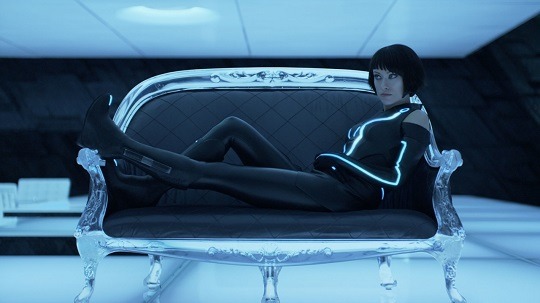
Legacy is, admittedly, not the best film. Even so, i had a ball with this one. The soundtrack by Daft Punk, alone, is worth the price of admission but couple that with the stunning, neon, visuals and you have a combo that can move even the most stoic of moviegoers. I absolutely adore this film. It get way too much hate for what it is. I’m a little perturbed we’ll never see the capping to this narrative but, for a second outing, I really did enjoy returning to this world. I’d put the first on this list but I really did connect with it beyond how dope it looked. Legacy gave me so much more to dig my teeth into and I respect it for that.
8. 12 Monkeys
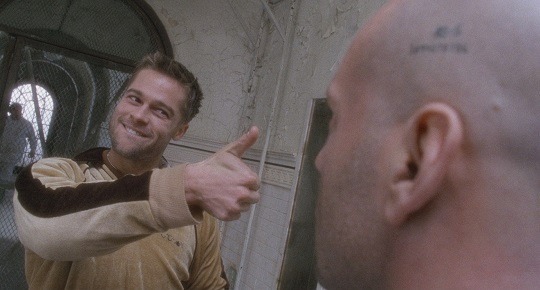
I don’t even know where to begin with this movie. I’ve seen it a few times and dissected it in a couple of essays for school but I'm still not sure if i understand it wholeheartedly and that is incredible. For a movie to keep me so off-balance and I still enjoy the show is testament to the brilliant direction on display. The plot, itself, as convoluted as it can be sometimes, is rather gripping once you get a handle on what’s going on and the performances are outstanding. Brad Pitt really shows his range in this one, shades of things to come. 12 Monkeys is a Cyberpunk on the strictest sense but, like The Matrix, I was hesitant to add it tho this list. But, also just like The Matrix, if it is truly a Cyberpunk film, it has to be required viewing.
7. Dredd

Dredd is entirely Cyberpunk. From page to screen, Cyberpunk everything. The first outing was a little too campy to make this list but the second? The Karl Urban Dredd? That one fits this list perfectly. It’s a crying shame we didn’t get a sequel. I was itching to see Judge Death do it’s thing but the siege of Peachtree was more than enough to sate my ultraviolent appetite. Seriously, this movie is outstanding and it’s a crime more people didn’t see it. I feel like if this thing was released today, maybe on VOD, it would get the respect it deserves. Too early to the party, it seems.
6. RoboCop
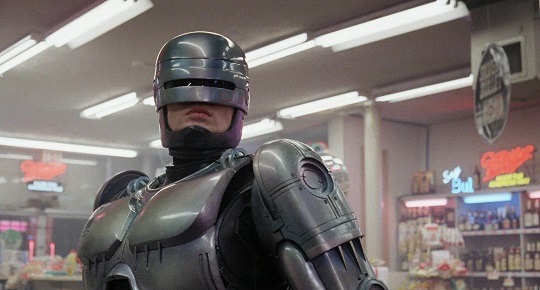
It’s crazy to me that all of the classic, US made, Cyberpunk movies are all championed by foreign directors. Ridley Scott, Denis Villeneuve, Terry Gilliam, and Paul Verhoeven. Verhoeven’s RoboCop is a scathing indigent of consumerism and it’s interchangeability with corruption. When I was a kid, that sh*t flew right over my head. All I saw was a dope cyborg named Murphy and a beautifully alien war machine called ED-209. As I got older, I learned to appreciate, more and more, Verhoeven’s vision and RoboCop became more than just an action film for me. This thing is one of the best in the sub-genre and far more intelligent than anyone gives it credit for being.
5. The Matrix
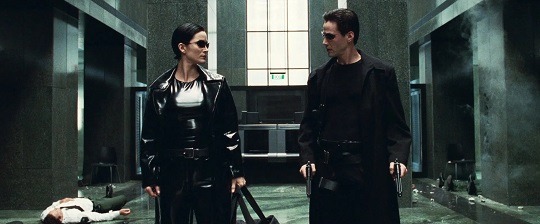
I don’t know if The Matrix belongs on this list. It never felt Cyberpunk to me but everyone else tells me it is. When I think about it, it checks all the boxes; Existentialism, robots, future dystopia, etc. All the boxes but I always felt it skewed more toward Neo Noir than anything. That said, if it is Cyberpunk, and it seems that is the accepted consensus, how can it not make this list? The Matrix is one of the most influential films ever made. It’s easily the greatest action film in history. Terminator 2 is usually the front runner for that title, I’ll eventually make a Select for action films so don’t worry, but Neo’s maiden voyage matches anything Cameron created.
4. Alita: Battle Angel
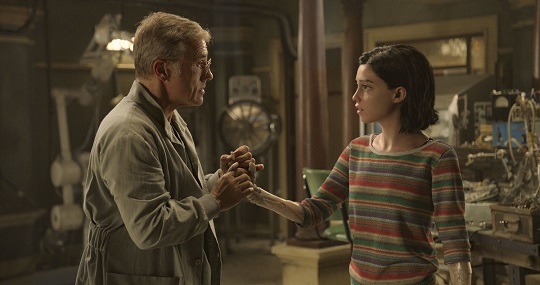
I was initially introduced to Alita way back in the early 90s. the SyFy channel, back then know as the Sci-Fi Channel, used to show these blocks of what was called “Japanimation”, later known properly as anime, and the original Alita OVA was one of the few that aired. I loved every bit of it. It got me wondering about the manga so i went looking for that, too. Imagine my surprise when it was hundreds of chapters deep and encapsulated an entire world. I was hooked. So was James Cameron because he optioned it for the big budget, US, blockbuster treatment and spent the next decade and change, adapting technology to bring Gally and her universe to life. What we eventually got was, hands down, the best adapted anime or manga to the big screen, ever. Alita: Battle Angel is an incredible film experience that deserves more eyes on it and more love. Here’s hoping HBO Max and ATT give it that sequel everyone wants because it gets real awesome after the rollerball arc we just witnessed. Plus, I mean, Rosa Salazar’s Alita is just f*cking adorable, man.
3. Akira
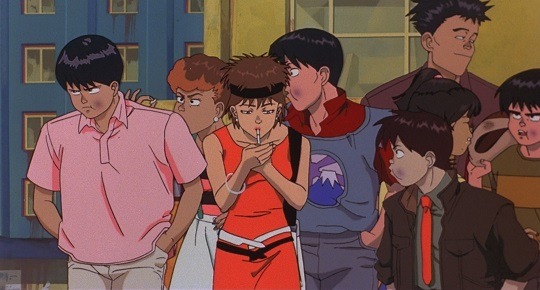
Akira was the first anime I really watched with intent and that viewing colored my perception of cinema going forward for the rest of my life. I had seen anime before, of course, but not like this. Macross and Go-Lion were serials, cartoons for kids, but Akira was a completely different animal. I didn’t understand the narrative as a child, that came later, but i knew the experience was revolutionary. As I watched this film over and over, year after year, I began to understand exactly the story being told in a critical nature. It wasn’t only the breathtaking visuals that held up. Akira is as influential as it is because of it’s absolutely pristine storytelling. It’s reputation is unassailable and if you count yourself a fan of cinema, you have to see it at least once. I am petrified at what America is going to do to this narrative, man.
2. Ghost in the Shell
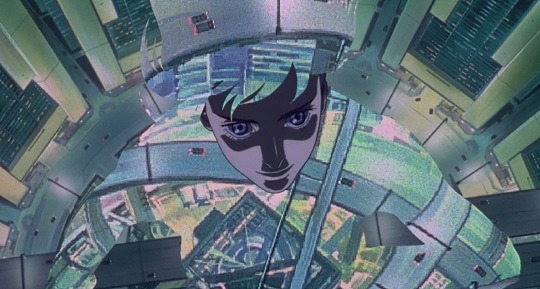
Ghost is easily the most balanced Cyberpunk film i have ever seen. It’s what I measure all movies in the sub-genre against. The narrative is poignant, profound, and perfectly executed. For the record, I’m speaking about the 1995 anime, not whatever the f*ck ScarJo starred in a few years back. That sh*t was the worst but Oshii’s masterpiece? That sh*t is the best. For such a short stint in Masamune Shirow‘s world, you are immersed in the grit of it all immediately. Kusanagi’s story, her struggle with being and conflict, mirror each other brilliantly. This would be top of the list if not for how much the world, itself, resembles our own. The Cyberpunk aesthetic kind of eludes this most Cyberpunk narrative. Even that juxtaposition is a positive in my eyes.
1. Blade Runner 2049
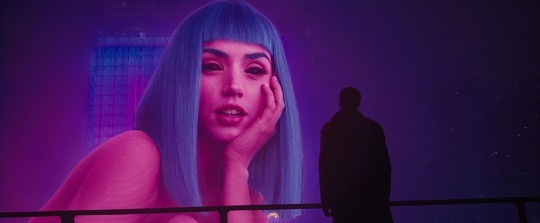
This one was hard to place. I love the original Blade Runner to bits. I think it’s a masterwork of cinema. It’s deftly acted, brilliantly directed, and easily one of the most gorgeous films I have ever laid eyes upon. And then Denis Villeneuve drops his continuation. Everything i just said about the original, stands for it’s sequel, but maybe even more. 2049 is breathtakingly gorgeous. It tells a simple, yet, emotional story driven by outstanding performances from everyone. No one is bad in this at all. I enjoyed the characters as much as I enjoyed the first’s, absolutely falling in love with Joi and Luv. This movie is everything and doesn’t get the love it deserves. Admittedly, it can be a little long in the tooth, but it needs all of that time to tell it’s story. If you commit to the narrative, engage with the visuals, and accept what the film is offering, you will be absolutely rewarded with one of the best movies ever captured on film.
Honorable Mentions: Terminator, Appleseed Alpha, Hotel Artemis, Run Lola Run, Demolition Man, Black Magic M-66, Elysium, Upgrade, The Lawnmower Man, Dark City, Armitage III, Ready Player One, The Zero Theorem, Minority Report, Looper
5 notes
·
View notes
Text
Smokey brand Select: Vast and Infinite
I’ve done a few of these Smokey brand Selects, lists of some of my favorite films in any specific sub-genre, and it occurs to me that I haven’t even touched my actual, favorite, sub-genre at all. A few of these movies have made different lists, sure, but I've never cobbled together an actual, dedicated, catalog for the Cyberpunk category. I absolutely adore these types of film. They capture every aspect I look for in a flick; Beautiful imagery, enthralling sounds, compelling narrative, existential questions, and so much more. The sheer depth of this genre lends itself to great storytelling, diverse creativity, and enthralling visuals. I love Cyberpunk and these films are some of the best I've seen.
10b. Johnny Mnemonic
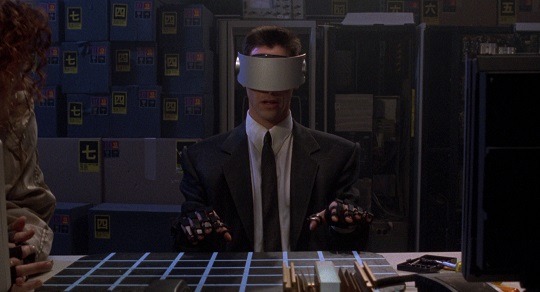
Johnny Mnemonic is probably the purest, US made, Cyberpunk film I have ever seen. It’s not a great watch, there’s a ton going on all of the time, but it is bursting with creativity and ideas. I adore this film, I really do. Even with all of it’s confusing, spastic, scatter-brained, story telling, I loved this film. Up until The Matrix and then John Wick, Johnny was my favorite Keanu Reeves performance. That, alone, has me coming back year after year. I highly recommend checking this one out if your a fan of the genre but it’s probably the weakest select on this list by a wide berth.
10a. Virtuosity
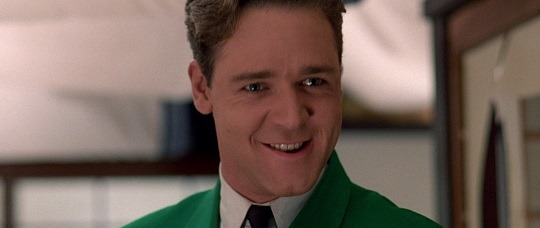
I was hesitant to put this one on the list because, I mean, this makes it eleven instead of ten, but moreso because I wasn’t sure of this thing qualifies as Cyberpunk. There’s a couple ahead on this list that have the same issue but I ended up putting them on so I guess this goes on here, too. Plus, I never hear anyone talking about this thing and I feel it deserves a bit more of a spotlight. Virtuosity is a goddamn blast. There’s a great performance from Denzel Washington a trite but ably executed plot, and some pretty interesting choices from a relatively new director. The strongest draw, however, is Russell Crowe as the artificial, glass eating, super psychopath, SID 6.7, as well as all of that mid 90s, virtual reality, conjecture. Virtuosity is definitely a product of it’s time but it's still a great time to watch.
9. Tron: Legacy
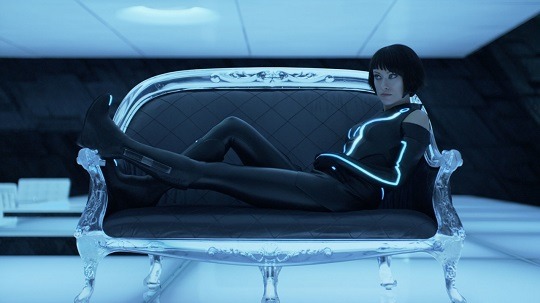
Legacy is, admittedly, not the best film. Even so, i had a ball with this one. The soundtrack by Daft Punk, alone, is worth the price of admission but couple that with the stunning, neon, visuals and you have a combo that can move even the most stoic of moviegoers. I absolutely adore this film. It get way too much hate for what it is. I’m a little perturbed we’ll never see the capping to this narrative but, for a second outing, I really did enjoy returning to this world. I’d put the first on this list but I really did connect with it beyond how dope it looked. Legacy gave me so much more to dig my teeth into and I respect it for that.
8. 12 Monkeys
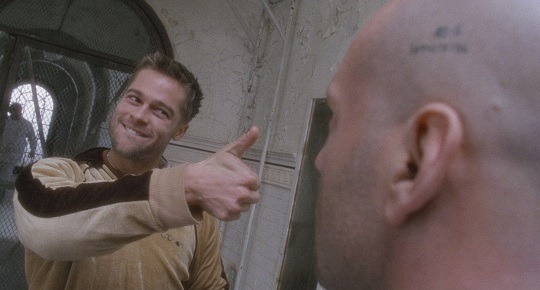
I don’t even know where to begin with this movie. I’ve seen it a few times and dissected it in a couple of essays for school but I'm still not sure if i understand it wholeheartedly and that is incredible. For a movie to keep me so off-balance and I still enjoy the show is testament to the brilliant direction on display. The plot, itself, as convoluted as it can be sometimes, is rather gripping once you get a handle on what’s going on and the performances are outstanding. Brad Pitt really shows his range in this one, shades of things to come. 12 Monkeys is a Cyberpunk on the strictest sense but, like The Matrix, I was hesitant to add it tho this list. But, also just like The Matrix, if it is truly a Cyberpunk film, it has to be required viewing.
7. Dredd

Dredd is entirely Cyberpunk. From page to screen, Cyberpunk everything. The first outing was a little too campy to make this list but the second? The Karl Urban Dredd? That one fits this list perfectly. It’s a crying shame we didn’t get a sequel. I was itching to see Judge Death do it’s thing but the siege of Peachtree was more than enough to sate my ultraviolent appetite. Seriously, this movie is outstanding and it’s a crime more people didn’t see it. I feel like if this thing was released today, maybe on VOD, it would get the respect it deserves. Too early to the party, it seems.
6. RoboCop
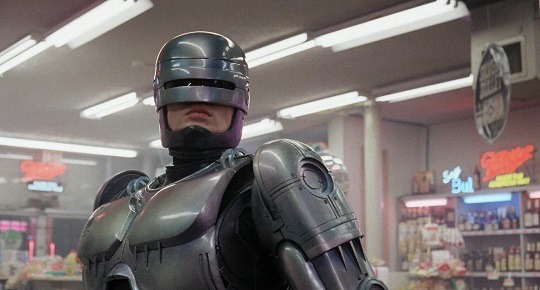
It’s crazy to me that all of the classic, US made, Cyberpunk movies are all championed by foreign directors. Ridley Scott, Denis Villeneuve, Terry Gilliam, and Paul Verhoeven. Verhoeven’s RoboCop is a scathing indigent of consumerism and it’s interchangeability with corruption. When I was a kid, that sh*t flew right over my head. All I saw was a dope cyborg named Murphy and a beautifully alien war machine called ED-209. As I got older, I learned to appreciate, more and more, Verhoeven’s vision and RoboCop became more than just an action film for me. This thing is one of the best in the sub-genre and far more intelligent than anyone gives it credit for being.
5. The Matrix
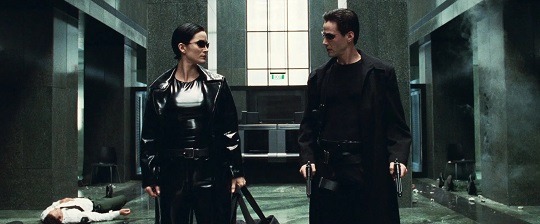
I don’t know if The Matrix belongs on this list. It never felt Cyberpunk to me but everyone else tells me it is. When I think about it, it checks all the boxes; Existentialism, robots, future dystopia, etc. All the boxes but I always felt it skewed more toward Neo Noir than anything. That said, if it is Cyberpunk, and it seems that is the accepted consensus, how can it not make this list? The Matrix is one of the most influential films ever made. It’s easily the greatest action film in history. Terminator 2 is usually the front runner for that title, I’ll eventually make a Select for action films so don’t worry, but Neo’s maiden voyage matches anything Cameron created.
4. Alita: Battle Angel
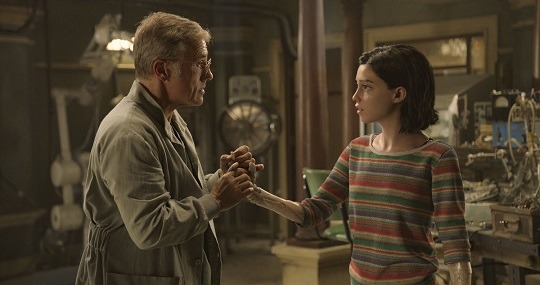
I was initially introduced to Alita way back in the early 90s. the SyFy channel, back then know as the Sci-Fi Channel, used to show these blocks of what was called “Japanimation”, later known properly as anime, and the original Alita OVA was one of the few that aired. I loved every bit of it. It got me wondering about the manga so i went looking for that, too. Imagine my surprise when it was hundreds of chapters deep and encapsulated an entire world. I was hooked. So was James Cameron because he optioned it for the big budget, US, blockbuster treatment and spent the next decade and change, adapting technology to bring Gally and her universe to life. What we eventually got was, hands down, the best adapted anime or manga to the big screen, ever. Alita: Battle Angel is an incredible film experience that deserves more eyes on it and more love. Here’s hoping HBO Max and ATT give it that sequel everyone wants because it gets real awesome after the rollerball arc we just witnessed. Plus, I mean, Rosa Salazar’s Alita is just f*cking adorable, man.
3. Akira
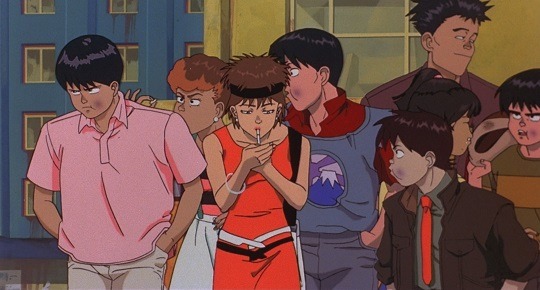
Akira was the first anime I really watched with intent and that viewing colored my perception of cinema going forward for the rest of my life. I had seen anime before, of course, but not like this. Macross and Go-Lion were serials, cartoons for kids, but Akira was a completely different animal. I didn’t understand the narrative as a child, that came later, but i knew the experience was revolutionary. As I watched this film over and over, year after year, I began to understand exactly the story being told in a critical nature. It wasn’t only the breathtaking visuals that held up. Akira is as influential as it is because of it’s absolutely pristine storytelling. It’s reputation is unassailable and if you count yourself a fan of cinema, you have to see it at least once. I am petrified at what America is going to do to this narrative, man.
2. Ghost in the Shell
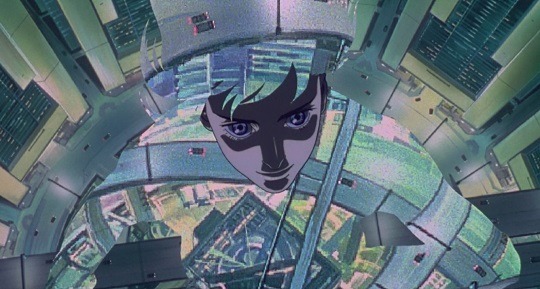
Ghost is easily the most balanced Cyberpunk film i have ever seen. It’s what I measure all movies in the sub-genre against. The narrative is poignant, profound, and perfectly executed. For the record, I’m speaking about the 1995 anime, not whatever the f*ck ScarJo starred in a few years back. That sh*t was the worst but Oshii’s masterpiece? That sh*t is the best. For such a short stint in Masamune Shirow‘s world, you are immersed in the grit of it all immediately. Kusanagi’s story, her struggle with being and conflict, mirror each other brilliantly. This would be top of the list if not for how much the world, itself, resembles our own. The Cyberpunk aesthetic kind of eludes this most Cyberpunk narrative. Even that juxtaposition is a positive in my eyes.
1. Blade Runner 2049
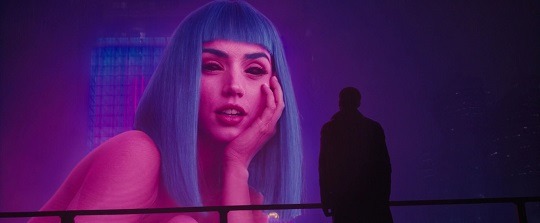
This one was hard to place. I love the original Blade Runner to bits. I think it’s a masterwork of cinema. It’s deftly acted, brilliantly directed, and easily one of the most gorgeous films I have ever laid eyes upon. And then Denis Villeneuve drops his continuation. Everything i just said about the original, stands for it’s sequel, but maybe even more. 2049 is breathtakingly gorgeous. It tells a simple, yet, emotional story driven by outstanding performances from everyone. No one is bad in this at all. I enjoyed the characters as much as I enjoyed the first’s, absolutely falling in love with Joi and Luv. This movie is everything and doesn’t get the love it deserves. Admittedly, it can be a little long in the tooth, but it needs all of that time to tell it’s story. If you commit to the narrative, engage with the visuals, and accept what the film is offering, you will be absolutely rewarded with one of the best movies ever captured on film.
Honorable Mentions: Terminator, Appleseed Alpha, Hotel Artemis, Run Lola Run, Demolition Man, Black Magic M-66, Elysium, Upgrade, The Lawnmower Man, Dark City, Armitage III, Ready Player One, The Zero Theorem, Minority Report, Looper
0 notes
Photo

Ep. 8 Of #TwinPeaks Is David Lynch's Purest Marriage Of Television And Video Art
Adam Lehrer , CONTRIBUTOR
It’s hard to describe how inestimable an impact David Lynch had over me when I first saw Mulholland Drive as a 14-year-old. Something I’ve been discussing with fellow artist friends of mine is the fact that the art that changed our lives the most and still carries the most weight over our own sensibilities is the art that we were exposed to very young, maybe even too young to fully understand what it is exactly that you’re viewing. I developed a taste for disturbing aesthetics at a very young age; when I was about five or six-years-old, my cinephile father would have “movie nights with dad” when my mom would go out with her girlfriends, and he would let my brother and I watch watch Ridley Scott’s Alien, James Cameron’s Terminator, and/or Paul Verhoeven’s Robocop when I still should have been reading children’s books (and boy am I thankful for that).
That early exposure to art, whether it be John Carpenter films, or Brian DePalma films, or Bret Easton Ellis novels, or my favorite music (Wu Tang, Lou Reed, or Marilyn Manson), is still the art that I think about and gravitate back towards even after decades of being exposed to just about everything contemporary art, cinema, literature, poetry, and popular music has to offer. But watching Lynch’s Mulholland Drive for the first time feels like a monumental point of epiphany in my life. A point where I thought to myself, “Maybe I want to create stuff when I grow up.” I had no idea what Mulholland Drive’s fractured plot meant, but its images left me confounded, and fascinated. I loved the dreamy, hallucinatory Los Angeles Neo-noir stylizations of its setting. I had never felt more terrified than when I first glimpsed that monster lurking behind the Winkie’s diner.
That film made me blissfully aware that cinema and art could be a simultaneously erotic, horrific, and thrilling experience. I knew how powerful art could be, but Mulholland Drive gave me my first taste of the sublime. Since then, I’ve been a David Lynch fanatic. I’ve watched all of his earlier films, binge watched Twin Peaks over and over (finding myself asking new questions each time), wrote college essays on Eraserhead and David Foster Wallace’s article that documented Lynch’s process on the set of Lost Highway, have searched out all his early forays into video art, have found merits in his more oft-overlooked output in advertising (his 2009 commercial for Dior is Lynch at his funniest), and have read countless analyses on the man himself and his cinematic language.
So, when you read what I’m about to say, know that I do so with much hesitance, consideration, and ponderousness: the eighth episode of Twin Peaks: The Return is the piece of filmmaking that Lynch has been building towards for his entire career. It is a singular cinematic and artistic achievement, and the purest distillation of the multitude of ideas and concepts that live and breathe in the Lynchian universe. I believe that years from now we will be looking upon this single episode as one of, if not the single most, defining artistic achievements of Lynch’s unimpeachable career. Bare with me.
Aesthetically, episode 8 would leave a powerful impression on even the most half-hazard of David Lynch converts. A hallucinatory, nightmarishly kaleidoscopic consortium of images of blood, flames, fluids, and demonic figures spews towards the viewer while Krystof Pendrecki’s tortuously atmospheric soundscapes underline the episode’s inescapable atmosphere of existential dread. Episode 8 is an hour long work of experimental video art, no doubt. But if you have been paying attention to this season of Twin Peaks and you know enough about the mythology of the show and know even more about Lynch’s artistic interests and visual touchstones, then you know that this episode was no mere act of meaningless artistic overindulgence. In fact, this was Lynch telling the origin story that set the entire series of Twin Peaks into place.
This was the origin story of BOB, the demonic force that forced Leland Palmer to rape his daughter for years and eventually murder her in Twin Peaks’ initial 1990s run. BOB, we learn in episode 8, was forged from the the United States' earliest forays into nuclear bomb testing. BOB was already the perfect metaphor for mankind’s capacity for cruelty, depravity and evil, and becomes an even more powerful metaphor now that we know his nuclear genesis. Any Lynchian fanatic will rave to you how delicious this notion is. What David Lynch has done, and in many ways has always been trying to do, is to create a piece of pure atmospheric video art that also works as a classic piece of narrative storytelling. In this episode, Lynch has perfectly located a zone in which vague and aesthetically menacing imagery also serve as clear and precise storytelling and, like the best cinema and storytelling, illustrates a metaphor for modern human existence. While Eraserhead, Mulholland Drive and Inland Empire, Lost Highway and Blue Velvet utilize video art aesthetics, they are also pieces of storytelling with easily identifiable stories if you look for them (well, maybe not Inland Empire). Episode 8 of the return of Twin Peaks is a mostly dialog-less piece of distorted, haunting images. It is art. But it also still tells a story. The story of a television series no less! This is all the more impressive in that television as a storytelling medium is the most reliant on expository dialog and over-crammed storyboarding.
David Lynch pays heed to the form while mainly utilizing the language of pure image. Who needs a script, and who needs dialog, when you can see that delectably menacing, fascinating and torturous world of Twin Peaks from inside the actual head of David Lynch? Episode 8 was the truest portal to the imagination of Lynch that has yet been put to screen.
I’m sure there are more casual David Lynch fans that are growing impatient with the restrained, at times glacial pace of this new season of Twin Peaks. I however have understood what he’s been doing this whole time. He hasn’t just been making a television season, he has been commenting on the current importance of television in our culture. Television has replaced cinema at the heart of cultural conversation for many reasons. Partly, this has been a result of the groundbreaking work that has been done in television over the last two decades: Twin Peaks, The Sopranos, Mad Men, The Wire, and more recently, The Leftovers have all expanded the possibilities of what people believe can be done with the form. There are also financial concerns: as major film studios continue to spend their whole wads on sure thing blockbuster action and superhero films, auteur filmmakers have had harder times getting their films properly funded. Cable and streaming television services like HBO or Amazon however have the means to give filmmakers the funds they need to realize a vision, and indie filmmakers have resultantly flocked towards the small screen.
Television’s prevalence has had connotations both positive and negative on culture. The negative, in my opinion, stems from its causing people to no longer be able to get lost in a pure, imagistic cinematic experience. Even the best shows are still mainly concerned with story and dialog, whereas cinema is about mood, atmosphere, and aesthetics. When Twin Peaks premiered in 1990, Lynch and co-creator Mark Frost (a television veteran) were very much interested in marrying the Lynchian world with the conventional tropes of television: serial drama, mystery, and even soap opera. Throughout its first season, it worked beautifully. Both Lynch aficionado cinephiles and mainstream television viewers alike were captivated, and the series was one of the year’s top-rated. But after the second season revealed Laura Palmer’s killer to be her demonic entity-inhabited father Leland far too early during its run, Lynch’s boredom with the constraints of television grew apparent. The show starts to feel like a standard nineties television show, albeit one with a quirky plot and wildly eccentric characters. Lynch mostly dropped primary showrunner duties to focus on his film Wild at Heart only to come back for Twin Peaks’ stunner of a series finale, when the show’s protagonist FBI Agent Dale Cooper travels to the mystical red velvet draped alternate universe of the Black Lodge, and eventually becomes trapped inside that Lynchian hellscape while his body is replaced with a doppelgänger inhabited by the demonic entity Killer BOB and set out into the world.
In the Black Lodge, Laura Palmer tells Cooper that she’ll see him in 25 years, and that's exactly where Twin Peaks: the Return starts off. It was apparent from the premiere episode of this new season of Twin Peaks that Lynch is benefitting from a new TV landscape in which Showtimes has awarded him full creative control over his product, and he’s directing all 16 episodes of this new season. Also, it’s quite obvious that the technological advancements over the last two decades have enabled Lynch to fulfill the fullest extent of his vision. Twin Peaks: The Return is a much purer marriage between narrative driven television melodrama and Lynch’s hallucinatory experimental video cinematic language. That first episode barely spends any time in Twin Peaks, but spends plenty of time with Cooper in The Lodge. There are some truly unforgettable images in that first episode: a demonic entity appears out of thin air in a cylindrical orb and viciously attacks a young couple having sex, a woman’s corpse is found on a hotel bed with most of her head missing, and who can forget Matthew Lilard, perhaps the newest victim to be inhabited by Killer BOB, in a jail cell accused of murder while Lynch moves the camera from cell to cell until we see the horrifying silhouette of BOB himself in high contrast red and black ghoulishly smiling? But at the same time, Lynch is able to move the plot forward in ways that should be familiar to all television viewers; through procedure, dialog, and plot device. Lynch is still working within the confines of television, but has peppered the narrative scenes with unforgettable imagery. It’s been almost as if he’s been subtly preparing us, the viewers, to not just respond to what we normally respond to in television: story, story, and story and dialog, dialog, and dialog. And to slowly reacquaint us with the thrilling experience that can be derived from watching a set of shocking, beautiful, erotic and terrifying images move along in a sequence on a screen.
And episode 8 of this new series is the pinnacle of this new body of work, and very possibly of Lynch’s career at large. The episode begins similarly enough, with evil Cooper escaping from jail only for his escape driver to attempt to murder him out in the woods. And that is when Lynch kicks it into overdrive. As evil Cooper’s body is bleeding out, a group of dirtied and horrific men called 'The Woodsmen' start picking over his body and smearing themselves in his blood, with Killer BOB himself appearing and apparently resuscitating Cooper’s lifeless body. And then, Lynch proceeds to tell BOB’s, and quite possibly Laura’s, origin stories through a 45-minute nightmarish experimental video art piece. The NY Times has called this episode “David Lynch emptying out his subconscious unabated.” That is totally accurate, and there has never been and most likely never will be an episode of television like this ever again. This episode was video art, but it was also still television, and it also served as a piece of and critique of cinematic and television languages. Allow me to explain.
Episode 8 functions in a way similar to that of the video art of Janie Geiser. Without any knowledge of the world of Twin Peaks or the themes of the Lynchian universe, one could admire this piece similarly to how they would admire the experimental video art of Janie Geiser, and in particular Episode 8 recalls Geiser’s film The Fourth Watch in which the artist superimposed horror film stills within the setting of an antique doll house. Episode 8 uses that same nightmare logic, but empowers it with the budget of a major Cable series. There are also similarities to scenes in Jonathan Glazer’s brilliant Under the Skin when the alien portrayed by Scarlet Johannson devours her male prey in a grotesque nether realm. And perhaps its greatest antecedent is Kubrick’s Big Bang sequence in 2001: A Spade Oydyssey, and in many ways Episode 8 is the hellish inverse of that epic sequence. Like the Big Bang, episode 8 tells an origin story of a world created by an explosion, but instead of a galactic explosion, Killer BOB and his world of evil were born of a nuclear explosion. Brilliantly, Lynch believes that Killer BOB was birthed by man made horrors, going back to something FBA Agent Albert Rosenfield said in the original series about BOB being a “manifestation of the evil men do.” Indeed, in Episode 8 Lynch brings us inside an atomic mushroom cloud set off during the first nuclear bomb test explosion in White Sands, New Mexico in 1945. As the camera enters the chaos and giving view to one horrid abstraction of flames and matter after another, we eventually see a humanoid creature floating in the distance. The humanoid eventually shoots tiny particles of matter out of a phallic attachment. One of those particles carries the face of none other than Killer BOB. The imagery is clear in its meaning: once humans created technology that could kill of its own planet, a new kind of evil had emerged into the world. Killer BOB is that evil imagined as a singular demonic entity.
But enough about the content, or the plot of the episode. There have already been plenty of recaps documenting its various thrilling enigmas: The Giant seemingly manifesting Laura’s spirit as a mutant bug that crawled into a young girl’s mouth via her bedroom window, or the horrific drifter walking around asking people for a light before he crushed their skulls with his bare hands and delivered a terrifying and poetic sermon over a radio airwave, or the impromptu Nine Inch Nails performance that preceded the madness. What is more important to note is the fact that there is a strong case to be made arguing that this episode was the pinnacle of all that David Lynch has ever tried to achieve. Lynch has always been a kind of pop artist. He comes from a background in abstract painting and sculpture, but he also has a deep and profound love for cinema that eventually influenced him to sit in a director’s chair. All kinds of cinema, from the kind of abstract cinematic geniuses you’d expect like Werner Herzog and Federico Fellini, to rigorously formalist filmmakers like Billy Wilder. From Eraserhead on, Lynch has tried to marry the formal conventions of cinema (plot, narrative, tension, juxtaposition, conclusion, etc..) with abstract and surrealist contemporary art. Twin Peaks was initially birthed of his interest in marrying conventional TV tropes, like soap opera and mystery, with that sense of terror art that he got famous for. But nevertheless, the constrictions of TV in the early nineties exhausted, and eventually bored, Lynch and he moved on. But now, he has been able to bend the conventions of television at will in this new season of Twin Peaks, and episode 8 was when he blew them up entirely. This hour of TV finds him drawing on all of his cinematic language and themes, from the surrealist ethos of his subconscious dream logic to origins of evil to the concept of dual identity (as this episode alludes too, Bob and Laura might be each other’s opposites, two side of one coin, if you will), while still working as a plot building episode within a contained, albeit sprawling, television narrative. There is no doubt that this episode will make the broad and at times confusing plot of the new season of Twin Peaks come into focus as it continues.
It was also the most mind-blowing cinematic experience I’ve had in years. And I watch everything. By successfully pulling off this episode, Lynch has also reminded viewers of the overwhelming potency that cinema and moving images can have that other mediums just don’t come close to. There is a lot of great stuff on TV right now, and one could even argue that something like Damon Lindelof’s The Leftovers had some jaw-dropping moments of pure cinema. But after watching Episode 8 of Twin Peaks: The Return, even the best shows feel like hour long scenes of conversation between people without much cinematic impact (on his podcast, American Psycho author and famed cinephile Bret Easton Ellis argues that television can’t do what cinema does visually because the writer is the one in charge, not the director, but that’s for another think-piece). Episode 8 is a reminder of the power of cinema, art and images. But it also still works as plot device for the over-arching narrative of the show. More than ever before, Lynch has pulled off a piece of work that indulges his wildest artistic dreams while still paying heed to the kind of formalism that television production necessitates. I don’t know about you, but when Twin Peaks: The Return returns for its second round of its 18 episode run this Saturday, I can’t wait to see what Lynch does next. We are witnessing something that will be written about by art historians as much as it will be by academics of pop culture. This is thrilling.
Link (TP)
21 notes
·
View notes